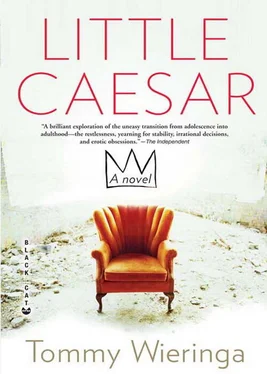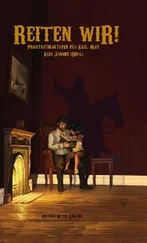There were three storms that winter, none of them with the force of the legends of 1286, 1342, 1740 or 1953. Warren’s seawall was battered away at a few spots, it was only below our house that a piece of the cliff was actually lost. A severe chasm now extended inland. Grass sods hung over its edge. Things were starting to get personal . Whenever the water struck, when the shivers rang through the house, we sat bolt upright. Then the silence drifted in like the fog.
At the end of that next spring I finished secondary school. I was eighteen, older than most of the pupils in my class because of the year I’d missed after Alexandria. Despite the urging of my tutor and the headmaster, I refused to consider university. As I walked out the door of the latter’s office, he said to me, ‘You have a good mind, Ludwig, it would be a pity not to use it well.’
I played piano at the Whaler and earned a lot of money for a boy my age. I was one of the first to buy a cell phone, and I had a computer in my bedroom. For the rest, I played rugby. Whenever I put in my mouth guard the sand would crunch between my teeth; lying in my bed at night, after the match, the grains of sand grated beneath my eyelids. I enjoyed the armor of aching muscles that girded me up for days after a match, the satisfied frisson of the body sorely tested. Someday, far in the future, you’d pass a rugby field and feel the painful yearning for Vaseline on your eyebrows, sports tape around your vulnerable spots, the pre-match nerves in stomach and fingertips that caused even the best, most experienced players to pop off again to the loo beforehand — and you would ask yourself how in heaven’s name you had ever become locked up inside that old body, and when you saw the bodies out there smacking together and scrambling back to their feet as though they had merely tripped, you would shut your eyes.
My mother and I live together in elegant separation. There is no reason to go into things any deeper. Sometimes I am able to see her the way I used to; that is to say, without the things I know now. The fact that things are ambiguous, not clear-cut, has been peppered into me. My mother has led so many lives already, her life with me was merely one manifestation. That makes you unsure of yourself. You can imagine suddenly being all alone, all the rest falling from you like wilted leaves, the skin of an onion.
It is our last summer on the hill. I have been excused from the assignment of having to belong anywhere; my mother’s past has everything to do with that. Now I am a freak, and therefore free. I could walk around naked, my skin no longer a shield against heat or cold but a permeable membrane — my body glides through the mild outdoor air like a paraglider above fields of corn. Along the wooded banks, trees stand like congealed forest fires, the dust of Flint Road covers my shoes. Even though I’m amid the lush nature of Essex, the cedar-like crowns of the Scots pine in the distance still remind me of Africa, my image of the savanna, a sensation so powerful that I can let it roll on for minutes at a time. The farmer’s binder has been shuffling back and forth across the fields for days, spitting out black bales of straw. The undeveloped plots between the road and the cliff’s edge are choked with head-high thistles, tansy, poppies big as a fist and daisies radiant in their simplicity. Butterflies waver above the polyphonic buzz of a field of flowers. The telephone poles along the road breathe creosote vapors, sparrows and sand martins sitting on the wires like notes on a staff. The borders at Warren and Catherine’s are exploding with voluptuous blue hydrangeas and then, suddenly, seen from the corner of my eye, the sparrows fall from the lines as one and dissolve into the mulberry hedges at the side of the road.
That winter our house was lost. At last, I would add from this vantage. A storm just before Christmas put an end to the wall, granting the second flood tide free access to the cliff. Warren never got the chance to fill up the lost earth; those were the first weeks of the new year, weeks during which almost no building was going on and no rubble was available.
Factors, circumstances.
When the forecasts began speaking again of bad weather, Warren appeared at the door with a face like iron.
‘I need to talk to your mother,’ he said.
I traipsed upstairs like a little boy and tried to listen in, but by the time they reached my ears the words had become unintelligible. Once he had left, I asked, rather casually, ‘So what’s the news?’
‘Oh,’ she said. ‘Warren thinks. . the forecasts are bad. He’s afraid, I mean, he thinks this might be the end.’
But still. The weight. The irreversible. It hasn’t made itself known, it was simply waiting for you all that time in the dark.
‘What are you thinking, love?’
I blinked back tears and said from the doorway, ‘I’m going to pack my things.’
What a house means. The walls around a cavity. It means inside, it protects you against the outside. Now inside was about to become outside. The roof would be ripped open, the dark sky would force its way in, the cold, black sea. I looked around my room, pondering over what should be taken and what not. There was no plan, no destination; the best thing was to pack as lightly as possible. I had a brown cardboard suitcase, found along the street, with stickers from a Rhine cruiser and the Lorelei. Two pairs of trousers, shirts, underwear, a bound-up packet of letters and postcards. For the rest, those valuables I thought I could probably hock should life turn against me: mother-of-pearl cufflinks, the automatic Tissot watch that had belonged to my great-grandfather, Friedrich Unger. (He, Friedrich Unger, had crossed the border from Ostfriesland to east Groningen province to marry a Dutch girl, Aleida Wanningen — ancestors immortalized in photographs in which time seemed recalcitrant and stiff, you couldn’t imagine people laughing out loud or cheating on their spouses. My mother got her beauty from Aleida; even the fashion of that day and the sepia print couldn’t hide her regular, noble features. Friedrich and Aleida’s son, Wilhelm Unger, known as Willem, was the father of my mother and Aunt Edith. I had never seen my grandparents; my grandmother died early on of heart problems, my grandfather had turned his back on my mother after Lilith . As far as my mother knew, he still lived with his second wife in the brick colossus close to Bourtange, the farm I knew from pictures in which my mother wore cotton dresses and walked barefoot through the dust of dry summers. When we were in Holland, the stopping-off place between Alexandria and here, he had refused to see us. That’s what his second wife, Aunt Wichie, said; he himself refused to come to the phone. At the time I had noticed nothing of that, that I had a grandfather not so far away.)
I took along some sheet music and three books, Moby Dick (my loveliest book), The Painted Bird by Jerzy Kosinski (from my mother’s bookcase, the promise of grown-up literature) and A History of Western Philosophy by Bertrand Russell; still unread, but impressive after our English teacher, Mr. Dowd, told us that Russell had written the book during a passage by steamer to the United States, from memory, almost without reference works.
A quiet knock on the door, my mother. Her arms folded across her chest, she leaned against the doorpost. I asked what she wanted.
‘There’s a truck coming the day after tomorrow,’ she said.
I looked around, the posters on the walls, the computer, the metal bed, the cupboard that listed to the right because it was not screwed together well.
‘That’s what I want to keep,’ I said, pointing to the things on the bed.
The howling of the wind, only the beginning.
Читать дальше












